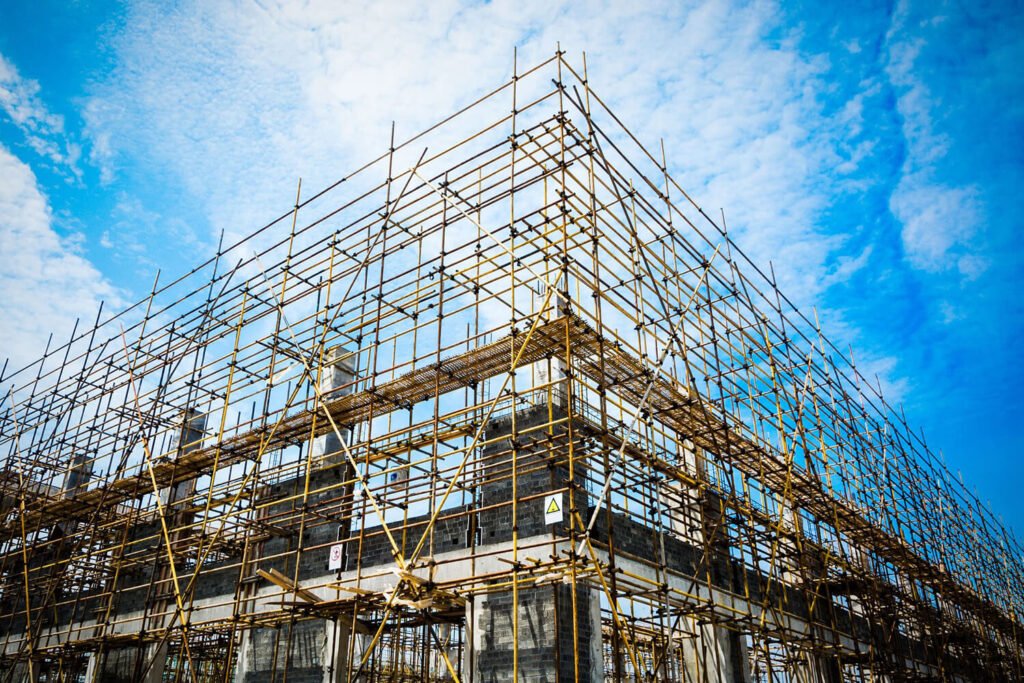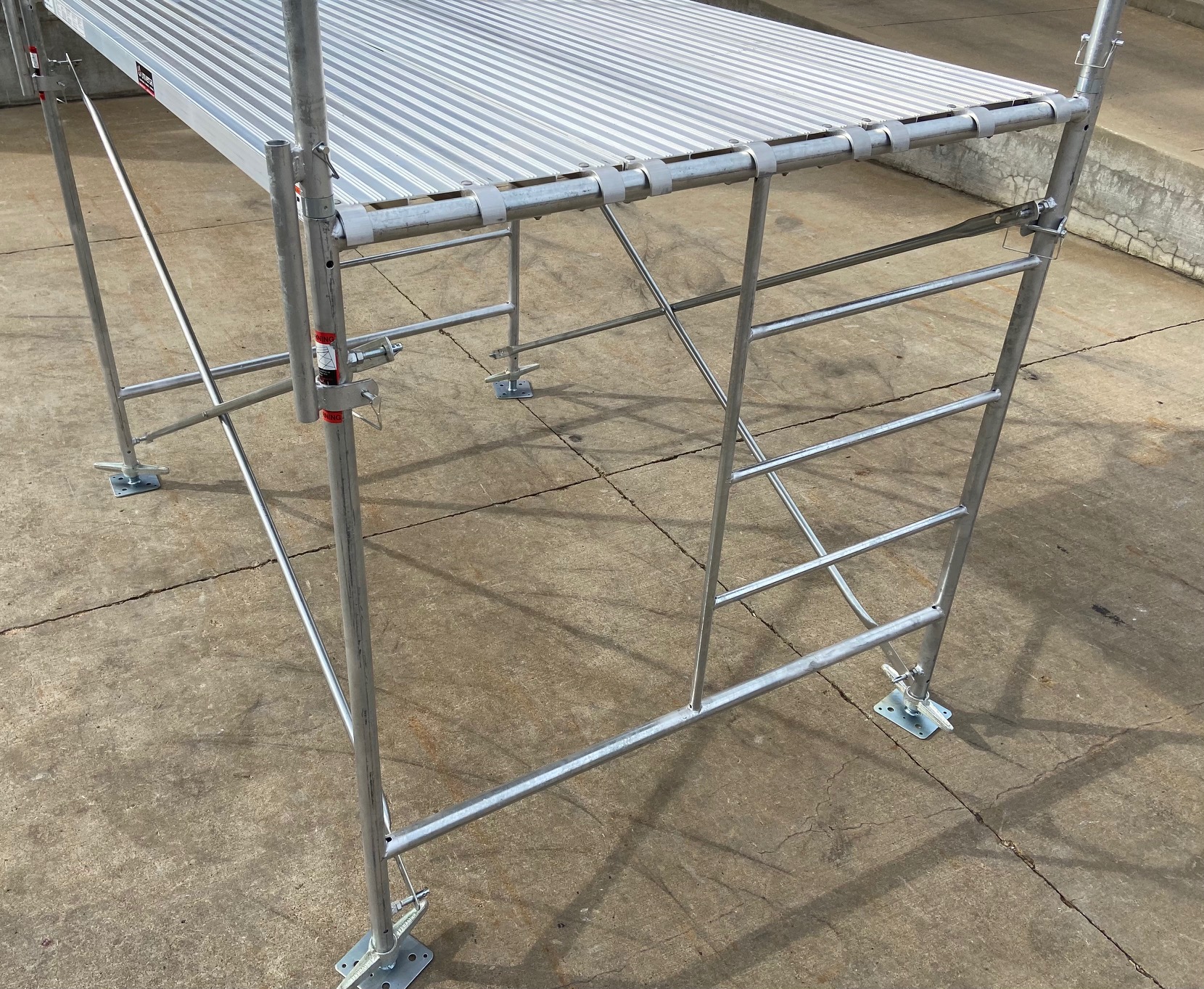Affordable Domestic Scaffolding for Every Home Renovation Project
Affordable Domestic Scaffolding for Every Home Renovation Project
Blog Article
Exploring the Numerous Kinds Of Scaffolding Made Use Of in Building And Construction Projects
The construction market counts greatly on various types of scaffolding to meet specific job demands, each offering distinct advantages and applications. Typical structure scaffolding gives a strong structure for general jobs, while put on hold scaffolding is crucial for job on high-rise frameworks.

Typical Frame Scaffolding
Typical framework scaffolding is just one of one of the most commonly used approaches in the building market due to its effectiveness and flexibility. This system contains upright and horizontal frames that are set up to develop a steady platform for workers and materials. The major parts include vertical posts, horizontal journals, and angled dental braces, which together supply a strong framework that can sustain considerable lots.
One of the key benefits of conventional structure scaffolding is its flexibility to different building projects, varying from residential buildings to large business structures. The modular design enables very easy assembly and disassembly, making it effective for both short-term and long-lasting jobs. Furthermore, the system can be personalized in elevation and width, accommodating various structure styles and website problems.
Security is paramount in scaffolding applications, and conventional frame systems are equipped with guardrails and toe boards to protect against falls and guarantee worker protection. Normal examinations and adherence to security laws are crucial in keeping the stability of the scaffold (Scaffolding). Generally, typical structure scaffolding continues to be a basic choice in the construction sector, supplying a reputable system for labor and improving total job effectiveness

Suspended Scaffolding
Suspended scaffolding uses an one-of-a-kind solution for building jobs that require accessibility to elevated surface areas, specifically in situations where conventional structure scaffolding may be unwise. This sort of scaffolding is usually suspended from the roofing system or top degrees of a framework, utilizing a system of pulley-blocks, ropes, and systems to develop a working room that can be gotten used to numerous heights.
Among the primary benefits of put on hold scaffolding is its versatility. It can be conveniently repositioned or decreased to suit modifications in building and construction needs, making it excellent for tasks such as home window setup, frontage work, and upkeep on skyscrapers. In addition, the very little impact of suspended scaffolding permits for much better use of ground room in urban environments, where area is frequently limited.
Safety is a vital consideration in the usage of suspended scaffolding. Generally, put on hold scaffolding provides a effective and reliable option for accessing hard-to-reach locations in different building scenarios, enhancing both performance and safety and security on website.
System Scaffolding
System scaffolding, usually considered a modern-day option in the scaffolding market, consists of pre-engineered parts that can be swiftly put together and adapted for various construction tasks. Scaffolding. This type of scaffolding is characterized by its modular design, which permits adaptability and effectiveness on job websites, fitting architectural demands and different elevations
Normally made from high-strength steel or aluminum, system scaffolding supplies improved sturdiness and stability. The elements include vertical posts, straight ledgers, and angled braces, which adjoin safely, ensuring a durable framework. The style frequently includes standardized installations, simplifying setting up and disassembly processes, therefore decreasing labor time and prices.

Rolling Scaffolding
Moving scaffolding is a flexible option to standard set scaffolding, created for wheelchair and simplicity of use on building sites. This sort of scaffolding contains a system supported by frameworks with wheels, allowing employees to conveniently transfer it as needed. The movement feature look at here considerably enhances performance, as it decreases downtime connected with disassembling and constructing taken care of scaffolding.
Normally built from lightweight products such as aluminum or steel, rolling scaffolding offers a tough yet portable solution for tasks needing frequent repositioning - Scaffolding. It is specifically beneficial in tasks such as paint, drywall installment, and electric work, where accessibility to various elevations and places is essential
Safety is extremely important in rolling scaffolding style, with features such as securing wheels to stop unplanned motion when in usage, and guardrails to safeguard employees from falls. In addition, numerous models are flexible in height, accommodating various task needs.
Cantilever Scaffolding

The style of cantilever scaffolding normally includes utilizing brackets or arms secured to a structure or structure, enabling the platform to expand exterior securely. Security is critical; thus, these scaffolds have to be crafted to stand up to different loads and environmental problems. Routine evaluation and maintenance are important to make certain architectural integrity and employee security.
Cantilever scaffolding is favored for its versatility and reliable use space, making it a popular option in metropolitan settings where area restrictions prevail. It helps with easier accessibility to high altitudes, eventually adding to the general performance of building tasks. As with all scaffolding kinds, proper training and adherence to security standards are essential for workers using cantilever scaffolding.
Conclusion
Finally, the varied kinds of scaffolding used in building and construction jobs each offer distinctive purposes customized to details site demands. Traditional framework scaffolding gives stability, while suspended scaffolding offers adaptability for raised tasks. System scaffolding helps with fast setting up, and rolling scaffolding boosts movement for varying job settings. Cantilever scaffolding effectively deals with challenges in urban setups. Understanding these scaffolding types is necessary for maximizing safety and productivity in building, eventually adding to look at more info the successful completion of jobs.
Standard framework scaffolding supplies a strong foundation for general tasks, while put on hold scaffolding is crucial for job on skyscraper structures.Rolling scaffolding is a versatile alternative to typical set scaffolding, created for wheelchair and simplicity of use on construction websites. As with all scaffolding kinds, appropriate training and adherence to safety criteria are essential for employees using cantilever scaffolding.
Conventional frame scaffolding gives security, while suspended scaffolding offers convenience for raised tasks. System scaffolding facilitates fast setting up, and rolling scaffolding improves mobility for differing job environments.
Report this page